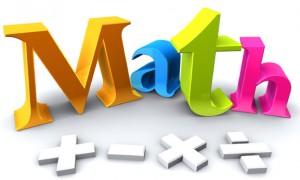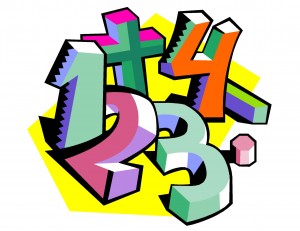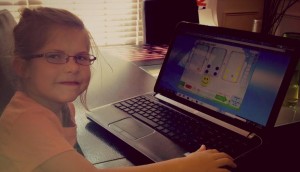At
Learning Ally, we help children with print disabilities like dyslexia and visual impairment. However, math is always a big topic of conversation. Students with learning disabilities may struggle in more than one area. We've often been asked:

How do you know when your child's math struggles may actually be a learning disability like dyscalculia?
Our guest blog this month is from
Chelsea Buchanan and Chrisy Clapp, two Tennessee teachers who work with students who have learning differences. Between them, they have over 30 years of experience working in the public school system, but they recently founded their own company called
C & C Educational Solutions to help children who have dyslcalculia and other disabilities. Read on to find out more.
* * * * * * *
5 Signs of Dyscalculia in Elementary Aged Children
There are numerous warning signs for dyscalculia, and as the child gets older the warning signs will change slightly. We have focused on warning signs in early elementary. If anyone needs warning signs for a different age they are welcome to contact us, and we will be happy to help. Parents will possibly see a variety of signs and they should know it is very common for dyscalculia to co-occur with other learning differences.
1. Difficulty Counting
Children with a math learning disability often show an inability or delay in subitizing, which is counting mentally. They also may show an

inability or delay in counting aloud, even counting on fingers proves to be a difficulty. In addition to difficulty, you will likely see great delays in development of these skills.
2. Difficulty sorting and organizing
This is really a problem with visual-spatial sense. This can be seen in the inability to sort shapes and difficulty matching shapes. They might also have an extremely hard time differentiating left and right. Telling time and judging accurately the passage of time is often exceptionally challenging.
3. Difficulty with number recall from print
This is seen when a student doesn't have the ability to associate a quantity with a standard form digit. For example, if they count five dots on a domino aloud they would likely not be able to point to a written digit 5 or write it themselves.
4. Difficulty with understanding numbers as quantities
Students may have trouble decomposing numbers. This means understanding that 10 is made up of six and four. This could also be displayed in students having an inability to grasp place value and the inability to visualize a mental number line.
5. Severe anxiety in relation to math:
Students with dyscalculia often struggle with anxiety in math. They lack confidence about their ability in math. They are even reluctant to partake in games and activities if they involve math based skills. They feel so much stress they will not join in with peers in games that require counting and math skills. As dyscalculiac students mature they have growing fears about obtaining employment that involves money or reading charts and graphs. Fears of being able to manage personal finances and tackle real world situations that involve math can be very stressful.
 However, there is hope!
However, there is hope! The correct intervention in dyscalculia, just like in dyslexia, means everything. Kinsley is one of our math students. Her Dad, Trent, says "she was below on everything on her report card for Kindergarten at the beginning of the year and now is at level or above. She is doing amazing!"
What can you do if your child has most of these characteristics?
First, I urge you to have your child evaluated by a psychologist who works with children who have learning disabilities. Like dyslexia, make sure to ask your specialist, specifically, if he or she diagnoses dyscalculia. There are also online screeners or profilers like the one we often use, the
Dynamo Profiler. Screeners

help you know if your child is at risk.
Next, you'll want to find the correct method and program to help your child. Just like with dyslexia, the method needs to be brain based and systematic, such as the program we use in our tutoring,
Dynamo Math. Any program you choose needs to be specifically made for dyscalculia, so make sure to ask if it is research-based for math learning disabilities. With a systematic approach in a program designed to address dyscalculia, the student can achieve success. Giving them more of the same instruction in a smaller setting is not going to help.
The intervention must change in order to see different results.
To find out more about dyscalculia, please visit our website:
C & C Educational Solutions
About Chelsea Buchanan: 
Chelsea's world was completely changed when one of her children began struggling with reading. Since she devoted her life to teaching children how to read, she didn't expect that her own child would struggle in this subject. Finally, her daughter was diagnosed with dyslexia, and the one Orton-Gillingham based program in her district was only available through special education, for which her daughter did not qualify. "Not being able to get the correct help for your child is truly one of the most helpless and infuriating feelings," says Chelsea. With her background in teaching, she wanted to help change the system. With her friend Christy, she founded C & C Educational Solutions.
About Christy Clapp: 
As an elementary teacher, Christy tutored children after school. She noticed some children were struggling greatly in reading and/or math, so she decided to do research on the top ranked programs based on science. She found the Orton-Gillingham methodology for reaching kids with dyslexia, but struggled to find a program to help children who have math disabilities. Finally, she found a company in the UK using "a program called DynamoMaths, and I called for a free trial," remembers Christy. "The owner answered the phone - what are the chances of that! She began to tell me her journey and her passion for dyscalculia." With her friend Chelsea, she founded C & C Educational Solutions.